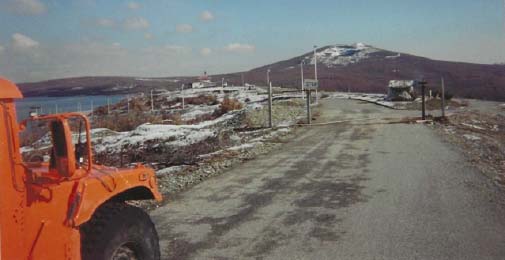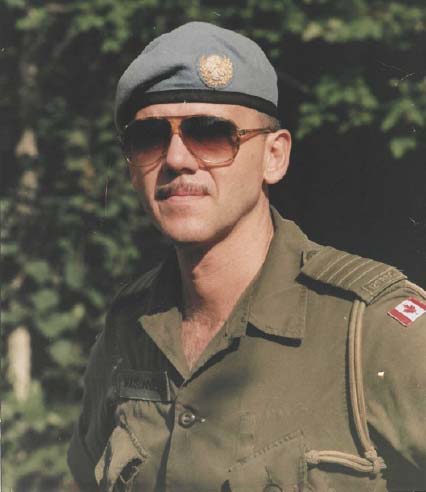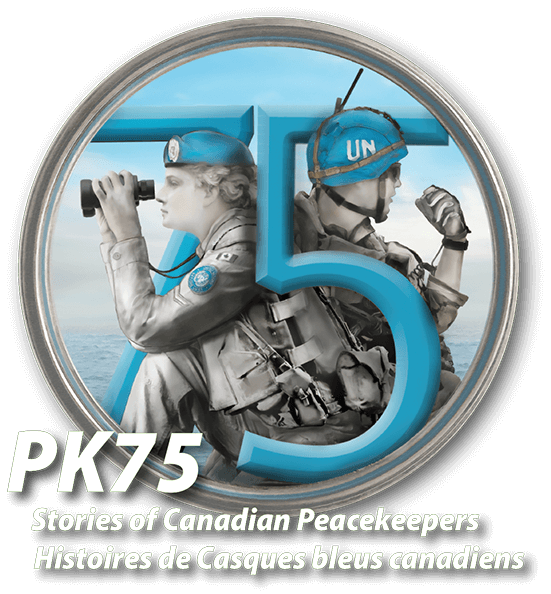

St. Jérôme, QC, Canada
Michel Maisonneuve
Current Location: Port Dalhousie, ON, Canada
The Kosovo Verification Mission
One day in November 1998, I was minding my own business as Director-General of the Army Staff in Ottawa when I was called into the office of the Commander of the Canadian Army, Lieutenant-General Bill Leach. He explained that someone was needed in the HQ of the Organisation for Security and Cooperation in Europe (OSCE) in Vienna to support the mission in Kosovo and that he was sending me … and he needed me to deploy … now!
The OSCE is the world's largest regional security organization; it is a political alliance of 57 nations, including Canada, usually involved in election monitoring.
After months of combat in the Kosovo province of the Federal Republic of Yugoslavia (Serbia and Montenegro) (FRY) between the Kosovo Liberation Army (KLA) and the forces of FRY, pressure on FRY President Milosevic finally forced him to sign an agreement on 16 October 1998. In this agreement, he agreed to a cease-fire, reduce FRY forces to pre-hostilities levels, and to protect the human rights of all peoples of Kosovo. The provisions of the agreement stipulated that it was to be verified by a mission of some 2000 unarmed civilian personnel provided by the nations of the OSCE, to be known as the Kosovo Verification Mission (KVM).
At the time of the agreement, ethnic Albanians made up 90 percent of the population of Kosovo. It was nearly ten years since the autonomous status of the province had been revoked. Since then, all civil administration, police, boards of education and state company positions were held by Serbs. Albanians essentially had no voice in any of their own administration. For ten years, the Albanian majority had attempted to use mostly non-violent means to change the situation. This period had yielded little, so elements formed their own rebel army known as the KLA and proceeded to employ more violent means to achieve their political goals. In return, President Milosevic reinforced the Serb police and armed forces in the province and began to suppress the KLA uprising, creating a humanitarian crisis which was seen on television screens around the world in the summer and fall of 1998.
The operational concept of the KVM split the province geographically into five Regional Centres (RCs) commanded by a HQ in Pristina, the capital of Kosovo. The mandate was to verify the agreement and report any violations to the OSCE, while trying to make a difference in the lives of the people of Kosovo. The mission was unarmed; ‘Verifiers’ wore civilian clothing and patrolled in contracted armoured 4x4 vehicles.
My deployment was going to be to Vienna for six weeks where I would support the deployed mission; except that after three weeks, I was appointed to lead the first RC to be set up in theatre. After a quick return to Canada to get more clean underwear, I arrived in Prizren where my first task was to oversee the transfer, to their families, of 35 Albanian Kosovars killed by Serbian border guards; a sad welcome to Kosovo.
The mission turned out to be the most demanding and pressure-filled operation I ever participated in. I spent three weeks in Vienna supporting the mission, then four months in Kosovo commanding an RC with 200 Verifiers, then being evacuated out of Kosovo by OSCE HQ due to the fear we would be taken hostage. I finished off with six weeks in Albania supporting their government receiving the 400,000 refugees being forced out of Kosovo by Milosevic.
While in Kosovo, I tried to use one of my personal principles of peacekeeping, “Seizing and Maintaining the Initiative”. The two sides were constantly keeping us on our toes and forcing us to respond to emergencies — real or imagined. So, at one point, I decided to seize the initiative from them. We were to have freedom of movement throughout the province on our patrols and verify MUP (Ministry of the Interior police) stations strengths, but were always hampered in both tasks. I then set up Operation Flood where ALL my patrols would depart on the same day at the same hour and “hit” all the MUP stations in the RC, even moving to the border with Albania which was always restricted.
This caused a furor as the Serbian authorities were forced to respond to our initiative all at the same time and they could not control our movement. I was asked to meet with my Serb MUP counterparts to hear their protests and responded we were only exercising the tenets of the agreement. For those few days, we had wrested the initiative from the belligerents and gained much credibility, not to mention that our mission members truly enjoyed being in the driver’s seat and forcing others to react.
Biography
Michel Maisonneuve was born in St. Jérôme, QC and at the age of 14, moved to western Canada where he learned English. He attended the Royal Military College of Canada where he graduated as the Cadet Wing Commander of the Centennial Class of 1976. Maisonneuve was posted to the 12e Régiment blindé du Canada (12e RBC) at Base Valcartier, Québec. He served his Regiment at all rank levels as an armoured Troop Leader, Squadron Commander and finally as Commanding Officer. He also served on exchange with the 12e Régiment de Chasseurs in Sedan, France, for two years, commanding a conscript troop of French Chasseurs, then as a regimental operations officer. He was Director of the Royal Canadian Armoured Corps from 1994 to 1996.
Maisonneuve taught Tactics at the Royal Canadian Armoured Corps School in 1980 at which time he was also appointed Principal Aide-de-Camp to the Lieutenant Governor of the province. He attended the U.S. Advanced Officer Armour Course in Fort Knox, KY, in 1984 where he was named a member of the Commandant's List. In 1987, he attended the year-long Canadian Forces Command and Staff College course in Toronto.
He completed three operational tours with the United Nations in Cyprus, in 1977, in 1983, and in 1990/1991, as Commander of the Nicosia Sector; in his last deployment there, he was also appointed Commander of the Canadian Contingent to the United Nations in Cyprus. On that occasion, he generated, trained, and deployed for the first time, a complete militia (reserve) squadron as part of the unit.
As a Colonel in 1993, Maisonneuve served for one year in the HQ of the United Nations Protection Force in the former Yugoslavia as Chief Operations Officer and was awarded the Force Commander's Commendation for his service. At that time, he coordinated the Medak Pocket operation for the UN. Later, he was appointed Executive Assistant to the Chief of Defence Staff.
In 1995, he completed the Senior Joint and Combined Warfighting course at the Armed Forces Staff College in the U.S., where he received the Douglas MacArthur Foundation Award. On his return to Norfolk eight years later as a 3-star general, he was inducted into the College Hall of Fame. In 1997, he was appointed an Officer of the Order of Military Merit by the Governor General of Canada. He was promoted to Commander of the Order in 2003. He was appointed an Officer of the French Legion of Honor in May 2003 by President Jacques Chirac.
In 1998, Maisonneuve was seconded to the Organisation for Security and Cooperation in Europe and served with the civilian Kosovo Verification Mission, then headed the OSCE-KVM Refugee Task Force in Albania. For his service in this mission, he was awarded the Meritorious Service Cross by the Governor General of Canada. He subsequently testified at the trial of Slobodan Milosevic and on two other occasions at the International Crime Tribunal for Yugoslavia in The Hague.
In May 2000, Maisonneuve had the honour of commanding the funeral ceremony for Canada’s Unknown Soldier on its repatriation to Canada from France.
In March 2003, he was promoted to Lieutenant-General and appointed Chief of Staff of NATO's Supreme Allied Command Atlantic HQ until its decommissioning and then he with his staff, stood up Supreme Allied Command Transformation HQ in Norfolk, VA, U.S.A. The Secretary-General of NATO recognized his service by awarding him the NATO Meritorious Service Medal in 2006. In addition, the President of the United States presented Maisonneuve with the U.S. Legion of Merit (degree of Officer) in recognition of his service to the U.S. while in Norfolk. He served with NATO until he retired from the Canadian Armed Forces in May 2007.
The Minister of National Defence appointed Maisonneuve as Academic Director (Principal) of Royal Military College Saint-Jean on 3 December 2007 after the re-opening of the College was announced. His efforts enabled the return of university status to the College. He retired from this post in June 2018, after ten and a half years and after a total of more than 45 years in the service of his country.
In September 2020, Maisonneuve was announced as the laureate of the 30th annual Vimy Award which “celebrates an individual’s significant and outstanding lifetime contribution to Canadian security and defence and the preservation of our democratic values.”
Lieutenant General Maisonneuve resides in Port Dalhousie (Niagara), ON with his wife Major Barbara Krasij (retired) and their canine companion and all-around good boy Kevin.

A view of Kosovo, with OSCE-KVM orange vehicle.

Colonel Michel Maisonneuve, Chief Operations Officer of UNPROFOR during the Medak Pocket Crisis, Sept 1993.


